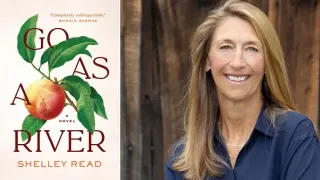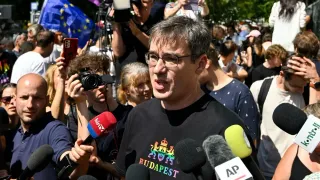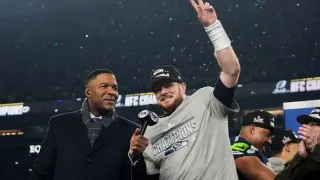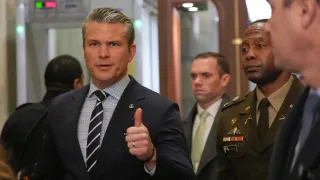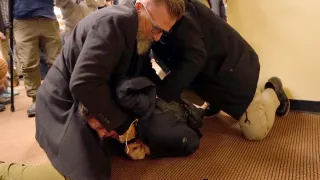July 2, 2017
SF Pride Parade Shows Love, Resistance
Alex Madison READ TIME: 5 MIN.
This year's San Francisco Pride parade was big on love and resistance, as hundreds of thousands of people lined Market Street to take in colorful contingents and those that vowed to keep fighting the policies of President Donald Trump.
As the 10:30 a.m. start time neared Sunday, June 25, people of all ages, races, and backgrounds, many decked out head-to-toe in the colors of the rainbow, lined the street waiting for the 47th annual San Francisco Pride parade.
The parade was a chance to celebrate individuality, freedom, and, as this year's theme stated, "A Celebration of Diversity." With this, however, came a strong message of resistance against the Trump administration and its derailment of rights and its policies that affect the LGBTQ community such as his travel ban, his promise to repeal the Affordable Care Act, and the spread of hate-filled rhetoric against marginalized communities.
"We have to make a stand to ensure our rights don't go backwards," said Nick Parker, a 47-year-old gay man from San Francisco who proudly walked with the Resistance contingent, one of the first in the parade lineup. "We must stand our ground."
Parker was among many people who walked with resistance groups at the beginning of the parade, including When We Rise activists and the board of the San Francisco LGBT Pride Celebration Committee. The groups exuded a more serious, political tone as members yelled into megaphones, "The people united will never be divided" as others passed out fliers to the crowd on information about universal health care.
Marchers held signs that read "Black Lives Matter," "No Ban, No Wall," and "Gay Rights are Human Rights," as others raised their fists encouraging the crowd to chant along, "No Trump, No KKK, No fascist USA."
One gay man, a spectator, removed his sunglasses revealing tears coming from his eyes as he watched the resistance crowd pass by. Standing next to his husband, Steve Mallory of Burlingame wiped away tears. When asked why he was emotional he answered, "Just seeing this large group stand up against this horrible situation we find ourselves in."
He talked about the struggles he has faced as a gay man, and how amazing it felt to be around so many like-minded and passionate people willing to fight against discrimination, fear, and exclusivity. He spoke of the importance of protesting.
"We've seen the options if we do nothing," Mallory, 61, said.
It was the roar of more than 300 motorcycles that got the resistance groups' powerful energy going. Dykes on Bikes, a nonprofit lesbian motorcycle organization, opened the parade. This year's Pride was especially important for the group. It was marking its 41st anniversary and members also applauded a recent U.S. Supreme Court decision allowing groups to trademark names that some might find disparaging. Dykes on Bikes had filed a friend-of-the-court brief in support of the Slants, an Asian-American band that sought to trademark its name. Last week the court ruled 8-0 that it could.
"This changes everything for us," said Kate Brown, president of Dykes on Bikes. Brown, 38, said this year the group is representing its strength no matter what forces are against it.
"No matter what's going on in the world, everyone here is out and proud and brave enough to say 'I'm a dyke on a bike.'"
As Dykes on Bikes rode past the crowd, fists up and some dressed as World War II icon Rosie the Riveter, the resistance movement followed.
"Forty-seven years ago Pride started out as a protest," SF Pride board President and KOFY personality Michelle Meow said during the televised broadcast, which aired Sunday evening. "We expect our community to come together."
Cordell Speaks Out
At the Alice B. Toklas LGBT Democratic Club's annual Pride Breakfast Sunday morning at the Hyatt Embarcadero, retired Santa Clara County Superior Court Judge LaDoris Cordell delivered a blistering critique of the Trump administration and congressional Republicans.
"I want to give a shout-out to Crystal Griner," Cordell said, referring to the married lesbian Capitol Police special agent who helped save the life of Congressman Steve Scalise (R-Louisiana) after he and others were shot on a baseball field outside of Washington, D.C.
"Let's see what his voting record on LGBT rights looks like now," Cordell added.
The White House, she said, wants to drastically cut programs that help the poor and the sick. And she criticized the First Amendment Defense Act, which is planned to be reintroduced this year. It would prohibit the federal government from taking discriminatory action against a person on the basis that such person believes or acts in accordance with a religious belief or moral conviction that: marriage is or should be recognized as the union of one man and one woman, or sexual relations are properly reserved to such a marriage.
"FADA officially makes us second-class citizens," Cordell said. "FADA stops the federal government from revoking tax-exempt status against businesses that discriminate."
Cordell said that the LGBT community must "resist, prevail, and interpose our bodies" by running for office and getting people registered to vote.
Wild, Happy Party
While the Pride parade started on a serious note, later contingents were intent on celebrating, and some, like Equality California, combined the exuberance with "Resist" signs. The elaborate floats came out, each more colorful than the next, the music began to blare, and the sequined costumes started to shine as the sun broke and the fog cleared.
Floats from major corporations came one after the other in the parade's estimated 250-contingent lineup. Netflix, McDonald's, Salesforce, PG&E, and Amazon, or in the parade, "Glamazon," were there in support of the LGBTQ community.
The city was also well represented with groups representing the San Francisco Fire Department, gay state Senator Scott Wiener (D-San Francisco), and many members of the Board of Supervisors, including board President London Breed, who used the 50th anniversary of the Summer of Love as her theme.
Nonprofits taking part included the San Francisco AIDS Foundation, and the National Center for Lesbian Rights, which received this year's Heritage of Pride Community Award.
One 16-year-old girl rode on the Next Generation Scholars float, an organization dedicated to providing educational opportunities to underserved youth. Miya Matsuishi, who identifies as bisexual, was a couple inches taller on parade day in her gold boots with knee-high rainbow-colored socks. She danced and waved on top of the colorful float adorned with hundreds of paper flowers and youth from all over the Bay Area holding signs they spent hours making. Matsuishi said this year was especially important for NGS to be here because of what some of her fellow students hear on TV and in the hallways at school.
"Pride is especially important this year," said Matsuishi who attends San Francisco University High School. "This administration is dredging up a lot of transphobia, homophobia, and racism, that has been hiding under the surface and our community feels that. It's been a rough couple of months, but this is a time for us to escape that for a few hours."
Confetti filled the streets as the parade went on for hours. People took photos of themselves with selfie sticks, ate hot dogs from the stands, and watched as colorful vehicles passed by and men in stilts wearing red speedos and wings waved to the crowd. Balloon Magic, always a colorful contingent, this year paid tribute to rainbow flag creator Gilbert Baker, who died in March.
Straight allies embraced their LGBTQ friends and stood along the sidelines with smiles on their faces.
For one parade participant, Alex Azevero, 39, who walked with Latinos de Ambiente, a nonprofit San Francisco group that supports gay Latinos, it doesn't matter who is in charge or the challenges the LGBTQ community will face. Azevero believes as long as the communities stay united, they will be OK.
"It doesn't matter who's the president," he said. "There will always be change and issues to fight against, but we must always stay united. If the community stays together there is nothing they can't do."
Cynthia Laird contributed reporting.
